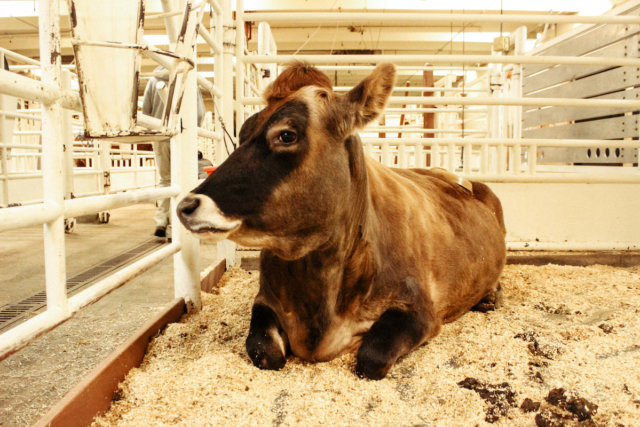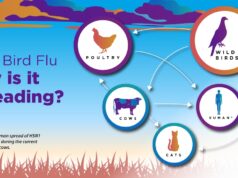

A packed gallery full of teachers rose to its feet and chanted “Fund Our Schools” on Tuesday as the Oklahoma House of Representatives gaveled out of session. Educators had come to the Capitol for the second consecutive day to demand increased education funding, this time honing in on SB 1086, which would end the income tax deduction for capital gains payments.
“We had an independent auditor tell us that this was an upside-down incentive where we lose about $465 million in revenue over a four-year period,” Rep. Cory Williams (D-Stillwater) said Tuesday afternoon.”We got an additional $9 million of investment in the state because of it. It’s one of the incentives we have on the book to get rid of, and it’s one of the reasons we have the oversight commission and things like that. But you know, oversight’s only as good as your backbone.”
Williams was referring to the recommendations of PFM Group, a consultant hired by the Oklahoma Incentive Evaluation Commission to examine various economic incentives on a yearly basis. But after a lengthy debate among its members that referenced a lack of Oklahoma data for full analysis, the OIEC actually voted in November to reject the PFM Group recommendation and encourage the Legislature to retain the capital gains deduction for corporate and individual income tax returns.
House Majority Floor Leader Jon Echols (R-OKC) spoke Tuesday of the debate over exactly what repealing the deduction would do.
“Capital gains is an issue that we haven’t fully vetted out,” Echols said. “We’re not going to move forward with capital gains this session. It’s an extremely volatile funding source.”
Multiple people with knowledge of negotiations over the recent revenue deal have told NonDoc that Echols’ position on hearing the capital gains bill stems from the agreement he struck with House members — of both parties — to raise the gross production tax incentive rate on oil and gas wells from 2 percent to 5 percent. Echols agreed not to eliminate the capital gains deduction this year as a way to solidify votes in favor of the GPT measure, multiple people told NonDoc.
“I don’t discuss internal caucus negotiations,” Echols said when asked about the situation.
Heifer breeders, ‘old widder women’ would be affected
Lawmakers with a heavy agriculture presence in their district are among those most opposed to SB 1086, since cow-calf operations pay capital gains on the heifers they purchase, feed, breed and sell while pregnant.
“The main effect is it would hurt farmers and ranchers who are already working on narrow margins,” said Rep. John Pfeiffer (R-Orlando). “It’s kind of a more specific model, but I’ve got a lot of constituents who go out and bring heifers in. They’ll go out and they’ll buy a semi-load or two of heifers up north — from some of the big ranchers in Wyoming, Nebraska, Montana — and they’ll bring them in and graze them on our good Oklahoma wheat we have here. And they’ll breed them, then they’ll turn around and sell them as bred heifers.
“The problem is that, as (SB) 1086 is currently written, these guys who, depending on the cattle markets and how much they have to buy these for, are working on very thin margins. They then (would) have to turn around and pay 5 percent income taxes on those heifers once they’ve sold them.”
Michael Kelsey, executive director of the Oklahoma Cattlemen’s Association, agreed with Pfeiffer that adding additional income tax requirements to the cost of operating a family ranch would be onerous.
“The average herd size in Oklahoma is rather small — about 30,” Kelsey said. “This affects family farmers and ranchers. For us, it’s not about a corporate hotel (and) downtown land development. It’s about families.”
Chatter among lawmakers and lobbyists at the Capitol on Tuesday raised the possibility that SB 1086 could be amended to exempt agriculture entities. Williams said he opposed amending the bill.
“There’s two problems with that. First off, if you amend it, then it’s going back over to the Senate,” Williams said. “In this building, I’d just as soon get it done and get it to the governor’s desk. That gets the teachers back in the classroom quicker. The other part is, if you carve out an exemption, then you’re going to be reducing the revenue.”
But Pfeiffer, who said he would vote against SB 1086, disagreed. A cattleman himself, Pfeiffer joked Tuesday that his northern-Oklahoma District features five counties, 18 school districts and 10 stoplights.
“It’s the timing issue that takes them from regular agriculture to qualifying for the capital gains deductions,” he said. “It fits a specific kind of timeline. They own these cattle longer than they do stocker steers, but a lot less time than cattle they’re breeding on a regular basis.”
He and Kelsey also said farm and ranch families would face higher taxes on the sales of non-homestead property they own.
“When it comes to land or real property, most farmers and ranchers have no retirement or savings. They’ve poured all of their assets into that land,” Kelsey said. “They pay capital gains on that land, so SB 1086 then would basically double tax.”
Pfeiffer said the sale of non-homestead property often occurs at the end of a rancher’s career or life.
“You’re dealing with people who have worked line of credit to line of credit. In typical farmer fashion, they’ve worked every year to make sure they can pay the bank back to borrow enough money to stay in business,” Pfeiffer said. “It’s really going to affect — ’cause I’ve seen it a lot in my home community and through my district — the widows of the farmers who have died.”
Pfeiffer said many older people in agriculture sell their farms “so they can afford to live in a nursing home or live in a nursing home closer to kids who have moved away.”
“A 5 percent income tax, which is what they would have to pay if the capital gains deduction (were eliminated), would really ding these retirees and these — for lack of a better word — old widder women who are just trying to retire and move close to their kids,” he said.
OK Policy and OK Farm Bureau disagree
In a series of tweets Tuesday, the Oklahoma Policy Institute called for SB 1086 to receive a hearing in the House, arguing that the capital gains income tax deduction benefits only 1 percent of Oklahomans.
Reason #1 to end the capital gains tax break: It costs the state $1 million and only benefits 1% of households. Call Speaker McCall and your state representative and ask them to repeal this wasteful tax loophole! #SB1086#OKleg#oklaedwalkoutpic.twitter.com/d8XLeQ8SXV
— Together Oklahoma (@TogetherOK) April 3, 2018
The Oklahoma Farm Bureau, on the other hand, opposes elimination of the capital gains income tax deduction. Associate director of public policy Bray Haven said in a statement:
As the largest organization of family farmers and ranchers in the state, Oklahoma Farm Bureau members overwhelmingly oppose the removal of the capital gains tax deduction. Our members — who create our grassroots policy in counties across Oklahoma — have always and continue to support public education. However, placing the burden of funding the state’s schools on family farmers and ranchers is concerning, especially with farm income at a 12-year low. Commodity prices have been stagnant over the last several decades, while operational costs have continued to rise.




















